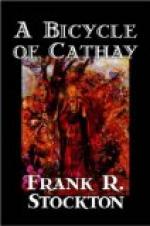“We do not generally accommodate,” “I said he might stay”—these were phrases which I turned over in my mind. If she were the lady clerk she might say “we”—even the boy said “we”—but “I said he might stay” was different. A daughter of a landlord or a landlady might say that.
I made a remark about the difficulty of finding lodging for man and beast, if the beast happened to be a bear, and I had scarcely finished it when from the house there came a shrill voice, flavored with lemon without any sugar, and it said, “Mrs. Chester!”
“Excuse me,” said the young lady, and immediately she went in-doors.
Here was a revelation! Mrs. Chester! Strange to say, I had not thought of her as a married woman; and yet, now that I recalled her manner of perfect self-possession, she did suggest the idea of a satisfied young wife. And Mr. Chester—what of him? Could it be possible? Hardly. There was nothing about her to suggest a widow.
CHAPTER VII
MRS. CHESTER IS TROUBLED
I sat on that porch a good while, but she did not come out again. Why should she? Nobody came out, and within I could hear no sound of voices. I might certainly recommend this inn as a quiet place. The Italian and the crickets continued singing and chirping, but they only seemed to make the scene more lonely.
I went in-doors. On the left hand of the hall was a door which I had not noticed before, but which was now open. There was a light within, and I saw a prettily-furnished parlor. There was a table with a lamp on it, and by the table sat the lady, Mrs. Chester. I involuntarily stopped, and, looking up, she invited me to come in. Instantly I accepted the invitation, but with a sort of an apology for the intrusion.
“Oh, this is the public parlor,” she said, “although everything about this house seems private at present. We generally have families staying with us in the summer, but last week nearly all of them went away to the sea-shore. In a few days, however, we expect to be full again.”
She immediately began to talk about Walford, for evidently the subject interested her, and I answered all her questions as well as I could.
“You may know that my husband taught that school. I was his scholar before I became his wife.”
I had heard of a Mr. Chester who, before me, had taught the school, but, although the information had not interested me at the time, now it did. I wished very much to ask what Mr. Chester was doing at present, but I waited.
“I went to boarding-school after I left Walford,” said she, “and so for a time lost sight of the village, although I have often visited it since.”
“How long is it since Mr. Chester gave up the school there?” I asked.




